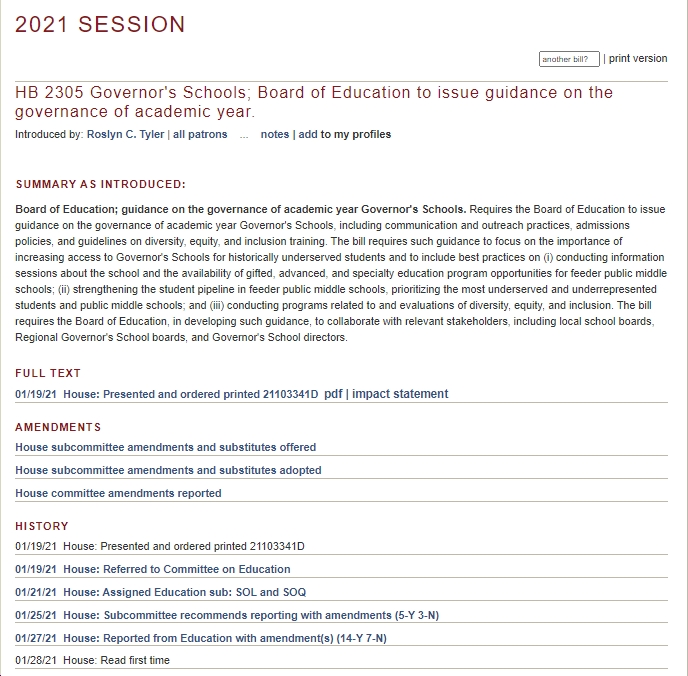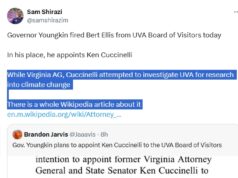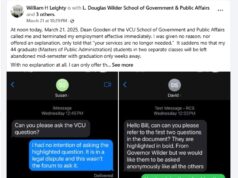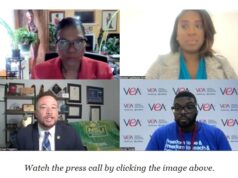 Back in September, Virginia Secretary of Education Atif Qarni argued for changes in admission policies to the Commonwealth’s “Governor’s Schools,” particularly the Thomas Jefferson High School for Science and Technology (“TJ”), in order to increase diversity at those schools. The problem, to date, is a distinct lack of diversity at “TJ” in particular. For instance, as this January 2017 article by State Senator Scott Surovell (D-Fairfax/Prince William) explained: “Thomas Jefferson’s population looks nothing like Fairfax County. It has a Black student population of 1.5% and Hispanic’s represent 2.23% of the school’s population compared to 10% Black and 24% Hispanic in FCPS as a whole.“ Sen. Surovell added, “I continue to be very disturbed by these trends and I’m open to ideas as to what to do about it because little seems to be changing after five years of complaints.”
Back in September, Virginia Secretary of Education Atif Qarni argued for changes in admission policies to the Commonwealth’s “Governor’s Schools,” particularly the Thomas Jefferson High School for Science and Technology (“TJ”), in order to increase diversity at those schools. The problem, to date, is a distinct lack of diversity at “TJ” in particular. For instance, as this January 2017 article by State Senator Scott Surovell (D-Fairfax/Prince William) explained: “Thomas Jefferson’s population looks nothing like Fairfax County. It has a Black student population of 1.5% and Hispanic’s represent 2.23% of the school’s population compared to 10% Black and 24% Hispanic in FCPS as a whole.“ Sen. Surovell added, “I continue to be very disturbed by these trends and I’m open to ideas as to what to do about it because little seems to be changing after five years of complaints.”
In response, in late July, Sen. Scott Surovell – who has been a leader on this issue – wrote that “[w]e need more equitable admissions practices in what are called ‘Governor’s Schools’,” and that along those lines, “Governor Ralph Northam appointed me to a task force with about 20 other individuals including State Education Secretary Atif Qarni to examine equity within our Governor’s Schools System.”
By the way, if you’re not familiar with “Governor’s Schools,” basically they’re “a collection of regional magnet high schools and summer programs in the Commonwealth of Virginia intended for gifted students…[that] currently serve in their various forms around 1000 gifted students from all parts of the Commonwealth.”
So along these lines, this past Wednesday, there was an intense debate in the Virginia House of Delegates Education Committee over HB2305, Del. Roslyn Tyler (D)’s bill that “[r]equires the Board of Education to issue guidance on the governance of academic year Governor’s Schools, including communication and outreach practices, admissions policies, and guidelines on diversity, equity, and inclusion training.” Sounds pretty non-controversial, right? Guidance – as opposed to a mandate – for the Governor’s Schools to help them increase the diversity of their students. But…nope. Instead, we had some heated debate, in part precipitated by a few of the public comments, and also by Del. Glenn Davis (R), who is running for Lt. Governor and clearly trying to pander to the right-wing “base.” See below the video for more, as several people – Secretary of Education Atif Qarni, Del. Roslyn Tyler, Del. Schuyler VanValkenburg, Del. Jeff Bourne, etc. – respond to people attacking this bill.
Del. Jeff Bourne: “My question would be just to clarify kind of what [the public commenter] said. She said there are ways to support or have opportunities for Black and Latino students while protecting what’s special about TJ. And I just wonder whether or not she would agree that that sounds an awful like ‘separate but equal’. And I just can’t understand the testimony…and we’re doing all these verbal gymnastics to speak against the bill that seeks to help support and open up opportunities for underserved and unserved populations…I didn’t ask whether or not the witness was supportive of ‘separate but equal’, but I wondered whether her comments and dichotomy that she posed about Black and Latino students and protecting the unique nature of TJ sounded like ‘separate but equal’ and if so how are we supposed to justify supporting that.”
Secretary of Education Atif Qarni: “I just want to articulate the administration’s strong support for the piece of legislation. I certainly hope that hearing from some of the speakers in opposition, the members of the committee realize what the administration has gone through the last seven or eight months…You’ve gotten a slight taste of the massive resistance that is being displayed and that Virginia is known for. And this piece of legislation is so important really to start developing robust guidelines and best practices to make sure that we provide equitable access for all of our children. And this is not meant to undermine or hurt any children. So it’s quite clear to me that folks are obviously going to resist regardless of how thoughtful this piece of legislation is. It’s a very modest first step to start really addressing our fragmented gifted programs or governor schools, which are at the heart of modern day school segregation here in the Commonwealth. So I urge everyone here to put politics aside and vote for this very important step. Thank you so much.”
Del. Schuyler VanValkenburg: “I just want to once again reset our conversation about this, because I want to really stress what this bill does and what this bill doesn’t do….So this bill is state guidance, suggesting ways to ensure equal access on the pipeline side. I think we need to hold two things in our head at the same time: one is the mission of a governor’s school…and I believe…maybe everybody on this committee doesn’t…but I believe we should do everything we can to ensure that those governors school keep that mission, that they are a place of excellence…a place of gifted students, that’s what they were created for. I know some people don’t like them at all, some people might want to change that; that is my personal belief…I think you can hold that in one hand and in the other hand say we have a serious pipeline problem where kids who have those gifts, kids who have those talents, are not getting access to the governor’s schools for a variety of reasons. And there ARE a variety of reasons. It is a complicated tricky subject and there are a lot of different issues at hand.
And so this bill does not touch the mission of governor schools. It doesn’t. It doesn’t. And I will be honest – I will never vote for a bill that tries to change their mission; I won’t do that. However, we have a ton of kids being left out in certain neighborhoods and in certain schools because they’re not getting access. Some of that is a function of how they they apply. Some of that as a function of what classes are available at different schools. Some of that is it’s a lot of different things. This bill simply seeks to try to create a more equitable and equal opportunity of access to the application process for a governor’s school. It is the lowest hanging fruit for ensuring all of our kids all…can have an opportunity to show their talents. It is NOT, as some speakers suggested, an attempt to water down the mission. It is NOT, as some speakers suggested, a way of ensuring other kids don’t have access. It is NOT, as some speakers suggested, getting rid of some race neutral thing. It is providing guidance to the localities to suggest how they can best optimize all kids showing their talents to get into a school that is for kids that are gifted and excellent and want to go on that path. So that is what we are voting on today. Any suggestion otherwise is wrong. Any suggestion that this is attempting to destroy the mission of government schools is wrong. And I will not vote for anything that tries to do that…let’s be very clear what we’re voting on.”
Del. Roslyn Tyler: ‘This particular piece of legislation is…for all governor’s school and is just simply starting the process of guidance and communication. No one wants to get rid of the governor’s school, but we do want to make sure that we enhance diversity, equity and inclusion so that every child who’s gifted and talent and for the students who are in underserved areas who may not get an opportunity.”
Del. Glenn Davis: “This bill is anything but a simple bill. And I think it’s very well intended by the patron of the bill, and I agree with a lot of things that she says…What I disagree with is how we get to equity…I agree with the delegate from Henrico 100%; I would never want to change the mission of this of TJ or any other governor’s school. But you have to read between the lines; words have meanings, and this piece of legislation – that’s exactly what it does, it opens up that door. And forgive me if I don’t trust the board of education right now not to walk a Mack truck through that door and do exactly what the delegate from Henrico and many of others do not want to have happen. Look, I agree that it is shameful that we don’t have more African-Americans and Latinos at TJ. I agree 100 percent.
But the problem isn’t the admissions policy. The problem is the failure of the Commonwealth of Virginia going back…both parties for not dealing with this underserved community before. We can have discussions all day long – why isn’t there bandwidth in certain areas? how do certain people get left out? why don’t we have charter schools? why don’t we have school choice in certain areas to bring wraparound opportunities and wraparound needs to those who have unique challenges in their families? But the commonwealth of Virginia never faced that. We have one of the worst set of charter school laws…We have a state that hates school choice for some reason. And how we feel better is by saying let’s bring down the bar of these governor’s schools so we can diversify those schools and feel better because one day we will be able to say that look at the diversity at TJ. I for one will not feel better looking at the diversity of TJ if I know we brought down a bar to get them there.
You want to help the pipeline? Lift up those those areas at the middle school level. Make sure that they have the same educational opportunity that I had in Virginia Beach, many of y’all had Northern Virginia and others have elsewhere. That’s how we fill that pipeline. If this piece of legislation talked about the feeder pipeline and dealing with the middle schools, I would be the first one to put my name on that bill. But what it does is it says we’re going to prioritize those in underserved communities and we’re going to play with admissions policies. I know what that’s code words for; I’ve been around long enough. So if anyone here wants to pass this so they can feel better, god bless them. But for me, we’ve had a long-standing problem in this Commonwealth for a long time and the only way we’re going to get it is by actually helping those get into the pipeline and achieve the same bar that we expect of everyone else, not by lowering the bar. We can achieve equity not by putting everyone into the same entity, but making sure everyone has the same level and opportunity to have that education that they deserve to be here, they meet all the qualifications, and we don’t skip these communities any further.”
Del. Roslyn Tyler: “I would like to ask Del. Davis a question…Are you indicating that because Black people or Latino or Hispanic people are causing the admissions or to be going to the governor’s schools to be lowering the bar? I don’t agree with that statement. No one said anything about lowering the bar. All this bill simply does is to…put simply a process in order. I think that’s all this bill is indicating. When it comes round to change, it has to start somewhere. And no one is targeting TJ or any other governor’s school; it’s just simply setting the guidance. And it’s not talking about just mission process, it’s also talking about community outreach, including the VEA, including PTAs and a bunch of stakeholders. So we are not just saying that because kids are not accepted into the governor’s schools, that is a problem. But we do want to have a way that undeserved kids have an opportunity to go to the governor’s school.
Del. Glenn Davis: “No, I do not believe at all that that having a diversity of Latinos or African-Americans coming to TJ lowers the ball at all…I would tell the chairwoman I do not believe that she intends to lower the bar, that’s not what I’m saying. I think her [sic] and I have this same aspiration. My concern is the way this piece of legislation is written allows for that bar to be lowered. And that’s my biggest concern. The minute we pass this, it goes to the board of education to set those guidelines. And my concern is at that point, discussion comes around that starts to lower that bar, and that’s what I want to protect. I think it’s what the chairwoman would like to protect… in no way do I believe that anyone of any race or ethnicity or sex would ever lower the bar of any of any school and we need to have good diversity; I just think we have to protect the mission as well.”
Del. Elizabeth Guzman: “Just for the purposes of clarification, you used the same comment during the subcommittee and I explained to you how offensive that sounded for people of color and you continue to use the same terminology. So I just want to bring that to the attention of the committee.”
Del. Joshua Cole: “I’m really just trying to figure out where we are – we’re in 2021 or we’re in 1960? Because it sounds like to me we’re using the same language from back in the day. Let me explain a couple of things to a few of my colleagues because I think we’re missing the point here. There’s a difference between equality and equity. Equality is giving everybody the same thing. And that’s what I’m hearing people – oh, there have to be qualified Black students, there have to be qualified Latino students. But what we’re missing the fact is we have data that proves that systemically, historically, that black students, children of color test poorly because of the systems that they’re in. So if we have that data, why are we claiming qualified Black students? Because we know that they won’t qualify in the current system that they’re in. So we need to give them equity. Meaning what they need to compare with the rest of their peers. And so I want to thank you, madam chair, for bringing this bill because it’s needed, it’s what we need at this time. And the children in these undeserved communities need equity, not equality, because they’re not going to make it if they’re given equality. They have to be given equity to make sure they can stand on the same grounds and they can match up with the rest of their peers. And that’s exactly what this bill does. And so if you are threatened by this or your children feel like they’re threatened by this, I don’t care where you come from or your zip code, you need to check your privilege. Because it’s not about who are coming in, it’s making sure that they can match up with their peers. And we need to make sure we’re giving them the equity that they need in order to succeed.”
Del. Suhas Subramanyam: “…What the point of this bill is, let’s just try to give the kids at Sterling middle school as well a chance. The second thing I’ll say is there’s a point made about this being anti-Asian, anti-Indian American, and that couldn’t be further from the truth. I just ask that folks who feel that we read this bill. I associate myself with Del. Cole’s comments, and I’m kind of disappointed by some of that rhetoric, to be frank…Those comments, as the only Indian American elected to this body, those comments do not reflect the feelings of this community. I think the Indian American community I know here in Loudoun County, in Fairfax County, believes that…the intentions behind this bill are are good and that they support diversity in these schools…I think many of them agree with Delegate VanValkenburg that…we don’t want to lower the standards, but you know, allowing kids of color…you don’t need to lower the standards to get those kids in…I hope that rhetoric goes away quickly and I thank the committee for pushing back on that.”
Del. Delores McQuinn: “Hearing this conversation just speaks volumes to how far we have come and how far we have yet to go. I…raised my hand several times and I put it down because I guess there was something, just somewhat of anger and just feeling sorry for where we are and some of the… things that I’ve heard. Because there were so many buzzwords and many of us who sit here we know exactly what is meant by it. First of all, let me just correct something – when you talk about underserved and unrepresented students, you’re not just talking about Black students and students of color. I…grew up in communities where there were plenty of underserved white communities, okay? Southwest Virginia is one of the most underserved places that we have in our Commonwealth. And I dare say that that there is probably a very small percentage of Blacks who are living in that area…I know that they are underserved, Ii know the poverty that exists there. So when you’re talking about underserved, it does not mean that it’s just Black students and students of color…This bill does not lower the standards. And Josh Cole was was just phenomenal in articulating what what is going on here…And Dr. Avoli, you said let the local governments handle it? Well, I think we need to give them some guidance. And it’s difficult because just as we are getting from the public this kind of pushback on moving in this direction, the local government, I’m not sure that they would have the wherewithal to really deal with it – they haven’t. And so that’s why it demands for us to step up and say, let’s look at the issue of equity, let’s begin to make sure that every child that’s in a certain category…let’s make sure they have an opportunity to walk through those doors. We have the next astronaut, scientist, president…going to come out of the governor’s school, and…we’re trying to change the society, we’re trying to change the world in which we live so it’s no longer monopolized by a certain group of people. Give everyone a chance to prosper, everyone a chance, opportunity to be educated and have the best of what we have to offer. There IS a problem and it’s not this process. My problem…is that again – and maybe Delegate Davis alluded to it – is that for 20 some years, those who have been charged, who have been in these seats, have not addressed issues of equity and equality and justice…We have an opportunity to create a paradigm shift and I know for one am determined to help make it happen.”
Del. VanValkenburg: “I just want to go back and just kind of root us back in what this bill does before we vote. To Delegate Avoli’s and Delegate Davis’ point, this is guidance to the local governments to try to find a way to bring more kids into the application process. It is NOT some hidden agenda as Delegate Davis suggested. And to Delegate Avoli’s point, this is not going to mandate on the localities and crush them; this is guidance to suggest best practices for how we can get the most kids possible to be applying to these schools so that everyone’s talents…are being recognized and we can get the most exceptional kids in these schools no matter where you come from. So I just want to make sure that we are all on solid ground about what this bill does before we vote.”
***********************
The bill then passed 14-7, with all seven “nays” by Republicans…unsurprisingly, sad to say.



 Sign up for the Blue Virginia weekly newsletter
Sign up for the Blue Virginia weekly newsletter








